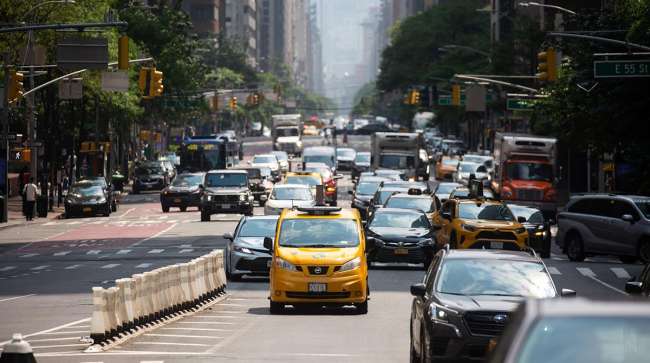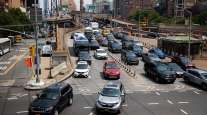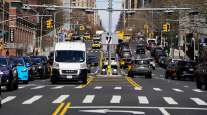Bloomberg News
New York Governor Delays Congestion Pricing

[Stay on top of transportation news: Get TTNews in your inbox.]
New York Gov. Kathy Hochul has indefinitely postponed a plan to charge motorists driving into much of Manhattan, upending an initiative that was slated to kick in at the end of the month.
Hochul will potentially replace the tolling plan with a tax on New York City businesses, according to a person familiar with the situation who requested anonymity because the proposal hasn’t been made public.
The governor cited inflation and financial pressures on working class New Yorkers as reasons to not implement congestion pricing.
“The decision is about doing what’s right for the people who make our city thrive,” she said June 5 in a pre-taped statement posted to the state’s website. “My focus must be on putting more money back into people’s pockets.”
The tolling plan, called congestion pricing and set to begin June 30, would be the first in the U.S. It is expected to bring in $1 billion a year that would help modernize a more than 100-year-old transit system that has been hit by episodes of heavy rain and severe flooding. The money was pegged to finance subway signal upgrades to reduce train delays, new electric buses and extending the Second Avenue subway to Harlem.
“This is a shocker,” said Andrew Albert, an MTA board member who voted in favor of congestion pricing. “It’s just unreal. The longer you wait, the more expensive things get.”
The shift away from the tolling initiative would be a relief for drivers, most of whom would pay $15 to enter Manhattan’s central business district, which runs from 60th Street to the bottom of the island. It’s also a sudden change — virtually all the tolling gantries are already installed on Manhattan streets and ready to charge drivers.

Hochul
“I’m proud to say we’ve stopped congestion pricing in its tracks,” said New York Congressman Pat Ryan, who represents parts of New York City’s suburbs. “Now it’s time to get to work on a plan that actually makes sense for the entire state, not just New York City.”
The congestion pricing plan was aimed at reducing traffic and improving air quality. Transit advocates spoke out against the delay, as it will stall critical infrastructure upgrades and hurt the MTA’s ability to serve as an economic engine for the New York City area.
“Delaying congestion pricing will only hurt millions of transit riders relying on improvements and hinder the economic success of our broader region,” Kate Slevin, executive vice president for the Regional Plan Association, a nonprofit organization that promotes initiatives for the region’s economy. “This move is a total betrayal of New Yorkers and our climate.”
Hochul’s decision to postpone it was reported earlier by Politico and the New York Times. Part of the consideration to delay stems from concern that the implementation would hurt Democrats in competitive House of Representatives races this year, according to Politico.
The decision comes as a federal judge overseeing a lawsuit by New Jersey was expected to rule on whether to put the plan on hold.
New Jersey Gov. Phil Murphy thanked Hochul on June 5for pausing the implementation.
“We have always had a shared vision for growing our regional economy, investing in infrastructure, protecting our environment, and creating good-paying jobs on both sides of the Hudson River,” Murphy said in a statement.
State lawmakers last year boosted the payroll tax on certain New York City businesses to help raise additional revenue for the MTA as subway ridership has yet to match pre-pandemic levels. Average weekday subway usage is about 70% of 2019 ridership.
Want more news? Listen to today's daily briefing above or go here for more info
It’s unclear if an alternative levy would raise an equal amount of money for the MTA, which runs New York City’s subways, buses and commuter rail lines. The plan was for the MTA to borrow against the $1 billion of congestion pricing revenue to sell $15 billion of debt to pay for necessary infrastructure needs to improve service and attract more riders.
Delaying or canceling congestion pricing without another funding source would put a massive hole in the MTA’s current multiyear capital plan. The transit provider, the largest in the nation, will also need new funding in its next capital budget for 2025-2029.




